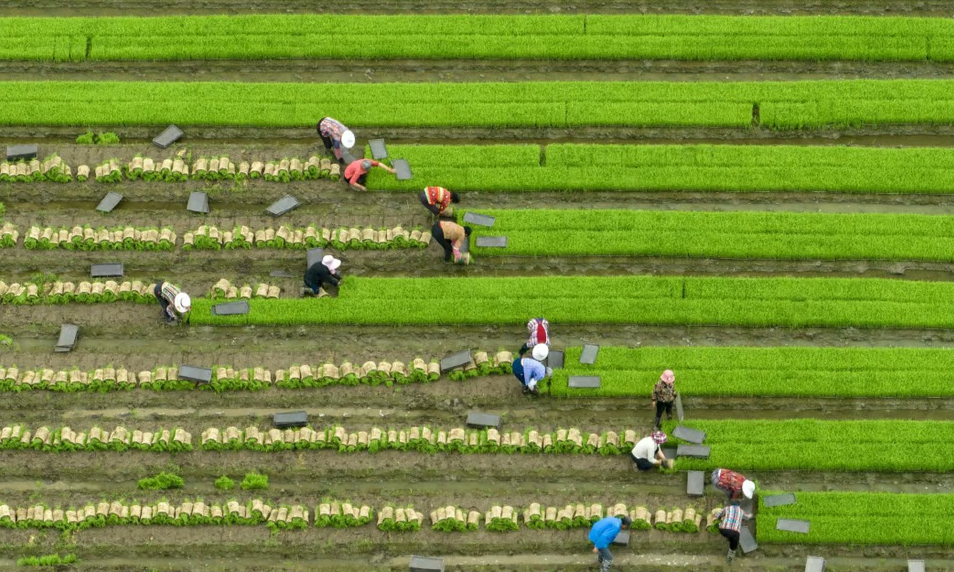May 29, 2025 | 22:48 GMT +7
May 29, 2025 | 22:48 GMT +7
Hotline: 0913.378.918
May 29, 2025 | 22:48 GMT +7
Hotline: 0913.378.918

China’s total arable land has decreased amid rapid urbanisation in recent decades, but the trend has reversed for the past two years. Photo: Xinhua
In a directive last week, the Ministry of Natural Resources said local governments were “strictly banned” from applying “one-size-fit-all” measures to land use, including bulldozing orchards, nurseries and ponds.
The order follows a slew of complaints about reclamation cases, including the city of Chengdu’s plan to reclaim about 6,700 hectares (16,556 acres) along a planned green belt surrounding the city to use for farming.
Food security has become a national priority in recent years as ties with the West have frayed and the war escalated in Ukraine.
China’s total arable land has decreased amid rapid industrialisation and urbanisation in recent decades, and local governments are now under growing pressure to guarantee a certain acreage for crop cultivation.
The ministry listed several measures local governments must not take to meet the central government’s requirements, such as converting land that is highly polluted, ecologically fragile or suffering serious soil erosion or desertification into cropland.
The latest directive also banned reclamation of land with a slope of more than 25 degrees or, if located above a major water source, a slope steeper than 15 degrees.
The directive said some governments had “just pursued the balance of farmland size on paper without considering how the land is used after reclamation, causing land loss again”.
Zheng Fengtian, a professor at Renmin University’s school of agricultural economics and rural development, said the latest order was a response to public concerns about reckless attempts at reclamation.
“It is also a reflection on the country’s farmland protection scheme linking the occupation of arable land for commercial development with reclamation quotas,” he said.
Under the scheme, adopted in the 2000s, if a plot of farmland is used for non-agricultural purposes, a new plot of farmland of equal size must be created. However, this has resulted in many local governments using good farmland for construction, then converting infertile land or slope land to farmland.
“There have been a lot of complaints about the system as local governments have to use land resources for urbanisation and want the system to be as flexible as possible,” Zheng said. “But for state supervisors, more specific regulation is needed to guarantee the quality of the new farmland created.”
Dang Guoying, a former researcher at the Institute of Rural Development under the Chinese Academy of Social Sciences, said a better solution would be improving the profits for crops rather than issuing administrative orders.
“I would say the government is intervening too much. Farmers will grow more crops in the fields if they can make good money from that,” he said.
China has been using subsidies and incentives in recent decades to help expand farming acreage across the country, but most young labourers still choose to abandon the fields and seek better-paid jobs in cities instead of pursuing agriculture.
(SCMP)

(VAN) Vikas Rambal has quietly built a $5 billion business empire in manufacturing, property and solar, and catapulted onto the Rich List.

(VAN) Available cropland now at less than five percent, according to latest geospatial assessment from FAO and UNOSAT.

(VAN) Alt Carbon has raised $12 million in a seed round as it plans to scale its carbon dioxide removal work in the South Asian nation.

(VAN) Attempts to bring down the price of the Japanese staple have had little effect amid a cost-of-living crisis.

(VAN) Fourth most important food crop in peril as Latin America and Caribbean suffer from slow-onset climate disaster.

(VAN) Shifting market dynamics and the noise around new legislation has propelled Trouw Nutrition’s research around early life nutrition in poultry. Today, it continues to be a key area of research.

(VAN) India is concerned about its food security and the livelihoods of its farmers if more US food imports are allowed.